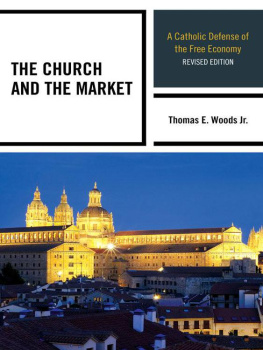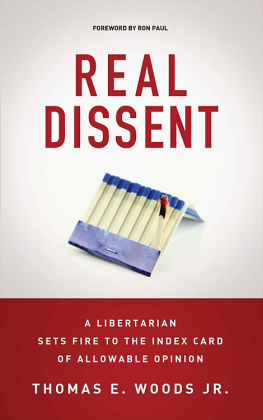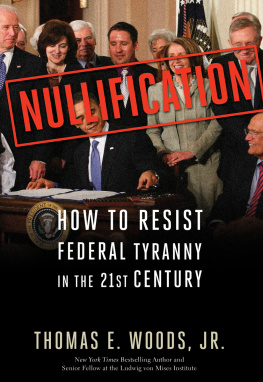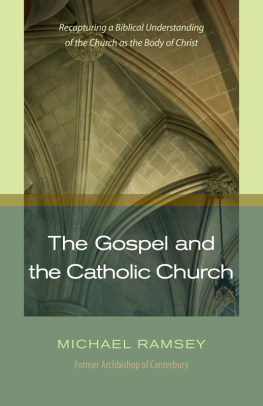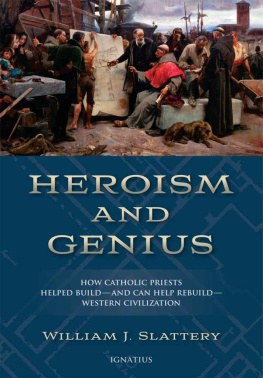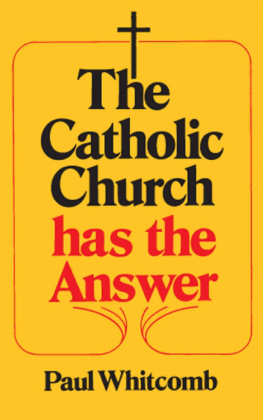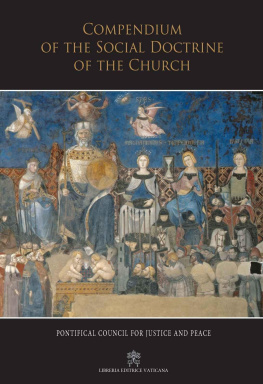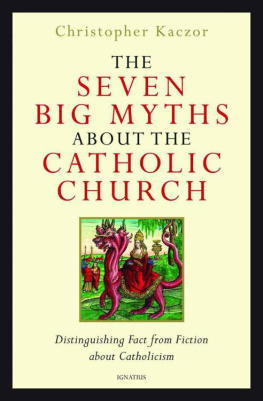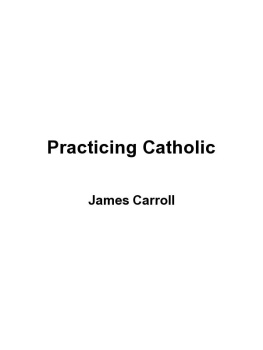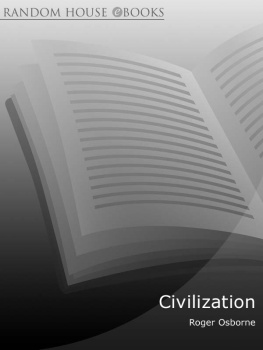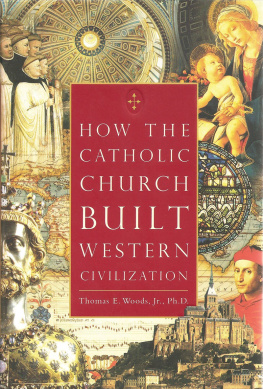HOW THE CATHOLIC CHURCH BUILT WESTERN CIVILIZATION
Thomas E.Woods, Jr., Ph.D.

Copyright 2005 by Thomas E. Woods, Jr.
All rights reserved. No part of thispublication may be reproduced or transmitted in any form or by any meanselectronic or mechanical, including photocopy, recording, or any informationstorage and retrieval system now known or to be invented, without permission inwriting from the publisher, except by a reviewer who wishes to quote briefpassages in connection with a review written for inclusion in a magazine,newspaper, or broadcast.
Library of CongressCataloging-in-Publication Data
Woods, Thomas E.
How the Catholic Church built Westerncivilization / Thomas E. Woods, Jr. p. cm.
Includes bibliographical references andindex. ISBN 0-89526-038-7
1. Catholic ChurchInfluence. 2.Civilization, Western. 3. Christianity and culture. 4. Catholic ChurchHistory.I. Title. BX1795.C85W66 2005 282'.09dc22
Published in the United States by
Regnery Publishing, Inc.
One Massachusetts Avenue, NW Washington, DC20001
www.regnery.com
To our daughters,Regina and Veronica
As this book went to press we learned that Pope John Paul II,
pontiffof twenty-seven years, had passed to his eternal reward.
The book is also dedicated to him, for his heroic laborsagainst Nazism and Communism and on behalf of peace and innocent human life.
CONTENTS
The Indispensable Church
Philip Jenkins, distinguished professor of history and religious studies atPennsylvania State University, has called anti-Catholicism the one remainingacceptable prejudice in America. His assessment is difficult to dispute. In ourmedia and popular culture, little is off-limits when it comes to ridiculing orparodying the Church. My own students, to the extent that they know anything atall about the Church, are typically familiar only with alleged Church"corruption," of which they heard ceaseless tales of varyingcredibility from their high school teachers. The story of Catholicism, as faras they know, is one of ignorance, repression, and stagnation. That Westerncivilization stands indebted to the Church for the university system,charitable work, international law, the sciences, important legal principles,and much else besides has not exactly been impressed upon them with terrificzeal. Western civilization owes far more to the Catholic Church than mostpeopleCatholics includedoften realize. The Church, in fact, built Westerncivilization.
Westerncivilization does not derive entirely from Catholicism, of course; one canscarcely deny the importance of ancient Greece and Rome or of the variousGermanic tribes that succeeded the Roman Empire in the West as formativeinfluences on our civilization. The Church repudiated none of these traditions,and in fact absorbed and learned from the best of them. What is striking,though, is how in popular culture the substantialand essential- Catholiccontribution has gone relatively unnoticed.
Noserious Catholic would contend that churchmen were right in every decision theymade. While Catholics believe that the Church will maintain the faith in itsintegrity until the end of time, that spiritual guarantee in no way impliesthat every action of the popes and the episcopate is beyond reproach. To thecontrary, Catholics distinguish between the holiness of the Church as aninstitution guided by the Holy Spirit and the inevitable sinful nature of men,including the men who serve the Church.
Still,recent scholarship has definitively revised in the Church's favor somehistorical episodes traditionally cited as evidence of the Church's wickedness.For example, we now know that the Inquisition was not nearly as harsh aspreviously portrayed, and that the number of people brought before it was farsmallerby orders of magnitudethan the exaggerated accounts that were onceaccepted. This is not merely special pleading on the author's part, but theclearly stated conclusion of the best and most recent scholarship.
Thepoint is that in our present cultural milieu it is easy to forgetor not to learnin the first placejust how much our civilization owes to the Catholic Church.To be sure, most people recognize the influence of the Church in music, art,and architecture. The purpose of this book, however, is to demonstrate that theChurch's influence on Western civilization goes well beyond these areas. Withthe exception of scholars of medieval Europe, most people believe that thethousand years prior to t he Renaissance were a time of ignorance andintellectual repression in which vigorous debate and lively intellectualexchange did not occur, and that strict conformity was ruthlessly imposed onwhatever scholarly community might be said to have existed. My students canhardly be blamed for believing this; after all, it is only what they were taughtin school and in American popular culture.
Evensome professional authors can still be found giving credence to this view. Inthe course of some research I came across a 2001 book called Second Messiah by Christopher Knight and Robert Lomas.These authors paint a picture of the Catholic Church and its influence onWestern civilization that could not be more wrong. They get away with it thanksto the strong prejudice against the Middle Ages, as well as an overall lack ofknowledge of the period, that exists among the public. For example, we read:"The establishment of the Romanised Christian era marked the beginning ofthe Dark Ages: the period of Western history when the lights went out on alllearning, and superstition replaced knowledge. It lasted until the power of theRoman Church was undermined by the Reformation." Again: "Everythingthat was good and proper was despised and all branches of human achievementwere ignored in the name of Jesus Christ."
Now,I realize that this is precisely what many readers were themselves taught inschool, but there is scarcely a single historian to be found today who wouldview these comments with anything but amused contempt. The statements made in Second Messiah fly in the face of a century ofscholarship, and Knight and Lomas, who are not trained historians, seemblissfully unaware that they are repeating tired old canards that not a singleprofessional historian any longer believes. It must be frustrating to be ahistorian of medieval Europe: No matter how hard you work and how much evidenceyou produce to the contrary, just about everyone still believes that the entireperiod was intellectually and culturally barren, and that the Church bequeathedto the West nothing but repression.
Notmentioned by Knight and Lomas is that it was in "Dark Age" Europethat the university system, a gift of Western civilization to the world, wasdeveloped by the Catholic Church. Historians have marveled at the extent towhich intellectual debate in those universities was free and unfettered. Theexaltation of human reason and its capabilities, a commitment to rigorous andrational debate, a promotion of intellectual inquiry and scholarly exchangeallsponsored by the Churchprovided the framework for the Scientific Revolution,which was unique to Western civilization.
Forthe last fifty years, virtually all historians of science- including A. C.Crombie, David Lindberg, Edward Grant, Stanley Jaki, Thomas Goldstein, and J.L. Heilbronhave concluded that the Scientific Revolution was indebted to theChurch. The Catholic contribution to science went well beyond ideasincludingtheological ideasto accomplished practicing scientists, many of whom were priests. For example, Father Nicholas Steno, a Lutheranconvert who became a Catholic priest, is often identified as the father ofgeology. The father of Egyptology was Father Athanasius Kircher. The firstperson to measure the rate of acceleration of a freely falling body was yetanother priest, Father Giambattista Riccioli. Father Roger Boscovich is oftencredited as the father of modern atomic theory. Jesuits so dominated the studyof earthquakes that seismology became known as "the Jesuit science."
Next page

